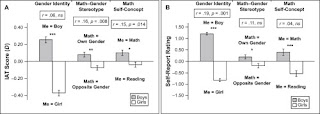The limiting effects of implicit self-beliefs
Our beliefs about ourselves can have a strong impact on how we behave and on how we develop and flourish. We are not always aware of our self-beliefs. There are what we call implicit self-beliefs. An example of such an implicit self-belief might be: "I am not a math person." Researchers Cvencek et al. (2015) of the University of Washington found, in a study with 299 Singaporean elementary-school students that children of this age often already have such implicit beliefs about whether they are or aren't 'math people'.
To make the self-beliefs of the students visible they administered a test to measure gender stereotypes about math and an implicit association test (IAT) to identify hidden self-beliefs about a range of topics. They also measured explicit self-beliefs by asking students to watch pictures with boys and girls on them and ask how these characters would like math.
The study showed that implicit, unconscious, self-beliefs predicted math performance. Implicit self-beliefs can be impacted by stereotypes which are held within a certain culture and they can emerge at a young age. They are hard to recognize because the child may not be aware of them. And they are important because they affect children's learning and achievement.
This study focuses on math but its findings are not confined to math, I think. Implicit self-beliefs can be about a wide range of topics. For example, children may have implicit beliefs about 'not being a smart person'. Such a belief can, of course, be influenced by prevailing stereotypes about men and women and about ethnicity, skin color, etcetera.
To me, it seems wise to expose children at a young age to the idea of a growth mindset which says that everybody can develop their abilities. Also, exposing children in stereotyped groups to positive role models can be helpful.
To make the self-beliefs of the students visible they administered a test to measure gender stereotypes about math and an implicit association test (IAT) to identify hidden self-beliefs about a range of topics. They also measured explicit self-beliefs by asking students to watch pictures with boys and girls on them and ask how these characters would like math.
The study showed that implicit, unconscious, self-beliefs predicted math performance. Implicit self-beliefs can be impacted by stereotypes which are held within a certain culture and they can emerge at a young age. They are hard to recognize because the child may not be aware of them. And they are important because they affect children's learning and achievement.
This study focuses on math but its findings are not confined to math, I think. Implicit self-beliefs can be about a wide range of topics. For example, children may have implicit beliefs about 'not being a smart person'. Such a belief can, of course, be influenced by prevailing stereotypes about men and women and about ethnicity, skin color, etcetera.
To me, it seems wise to expose children at a young age to the idea of a growth mindset which says that everybody can develop their abilities. Also, exposing children in stereotyped groups to positive role models can be helpful.

Comments